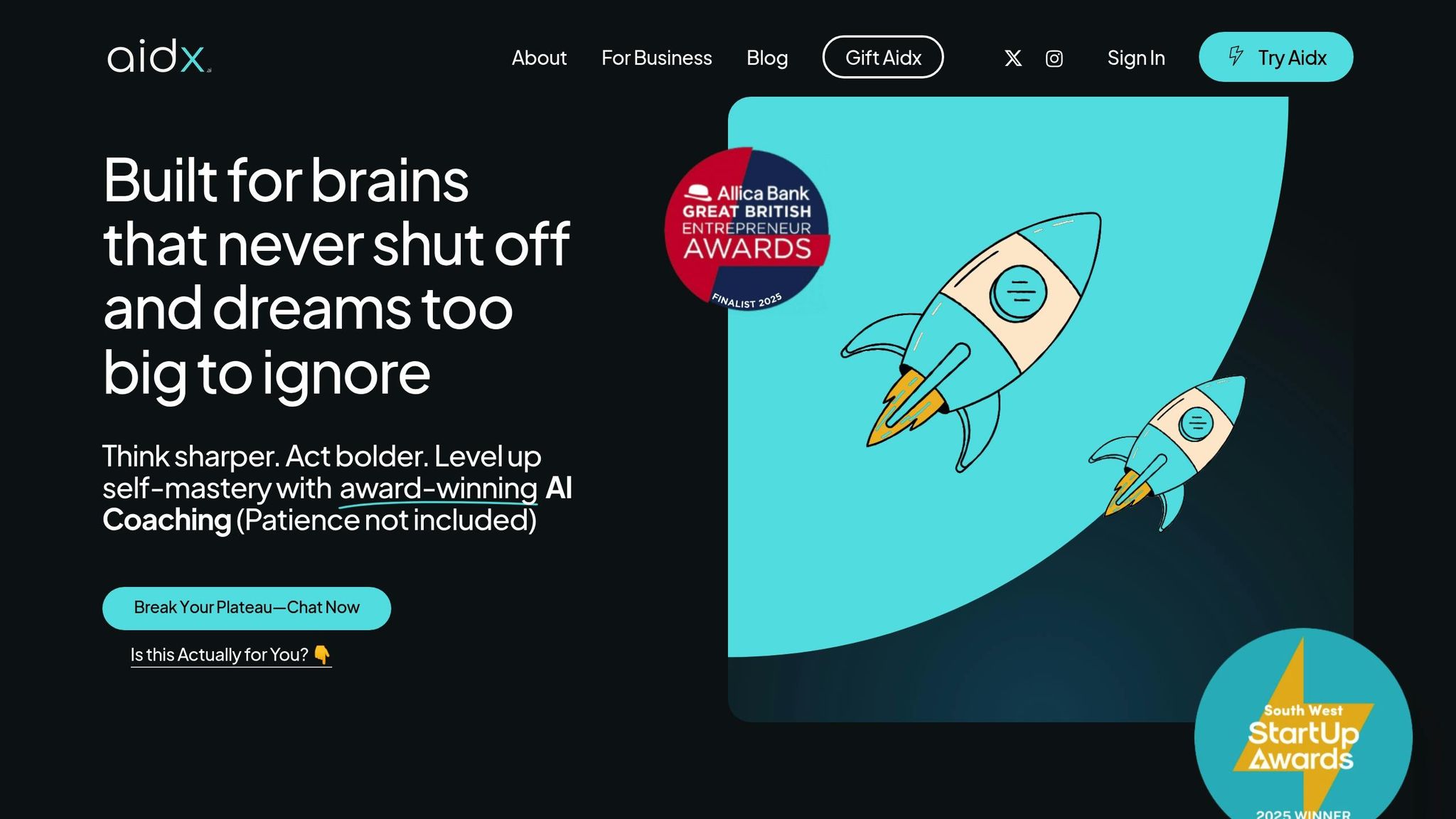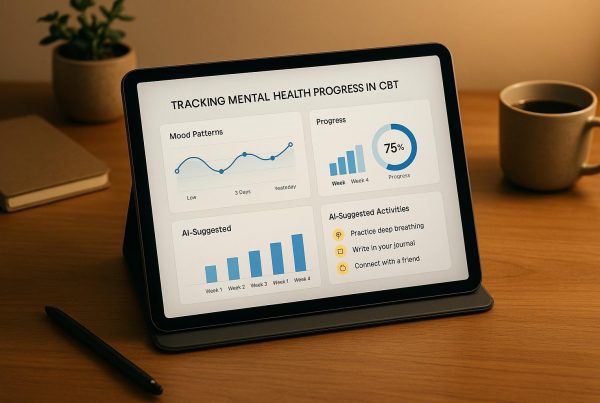A new range of AI emotional regulation tools are transforming how people manage emotions, stress, and personal growth. These platforms use advanced algorithms to analyze data from wearables, voice patterns, facial expressions or conversations, offering real-time, personalized support. Many integrate proven therapeutic techniques like CBT, DBT, and ACT, making them highly effective for emotional management.
Key Benefits:
- Real-time support: Immediate guidance during stressful moments.
- Personalized strategies: Tailored exercises based on emotional patterns.
- Affordable: Monthly subscriptions range from $9.99 to $29.99.
- Progress tracking: Tools monitor and visualize emotional growth over time.
- Privacy-first: Data encryption and compliance with GDPR standards.
How They Work:
- Emotion recognition: Analyzes biometric and behavioral data with 95% accuracy.
- Guided interventions: Delivers coping exercises and mindfulness practices.
- Goal-setting: Encourages emotional growth with measurable outcomes.
One standout tool, Aidx.ai, uses its Adaptive Therapeutic Intelligence (ATI) System™ to refine support over time. With voice-enabled features, it offers three modes for personal, business, or performance goals. These tools are reshaping emotional wellness, offering accessible, effective solutions for everyday challenges.
Can AI Replace Your Therapist? Here’s What You Need to Know Before You Try
How AI Emotional Regulation Tools Work
AI emotional regulation tools operate on a blend of advanced technology and therapeutic methods, offering personalized, real-time support for emotional well-being. By combining data streams, sophisticated algorithms, and established therapeutic techniques, these tools create a system tailored to each user’s needs. Below, we explore how they recognize emotions, provide personalized guidance, and prioritize privacy.
Emotion Recognition and Tracking
These tools excel at identifying and monitoring emotional states with remarkable accuracy. They gather biometric data from wearables and sensors, analyze voice patterns (including tone, pitch, and tempo), and assess behavioral patterns like typing speed, word choices, and app usage [2]. Together, these data points paint a clear picture of a user’s emotional state, allowing the system to detect subtle changes early.
AI emotion tracking systems boast a 95% accuracy rate in identifying emotional states by integrating these diverse data sources [2]. This precision enables proactive support, addressing emotional triggers before they escalate, rather than reacting after the fact.
Once emotions are tracked, the tools shift focus to delivering personalized strategies for emotional management.
Personalized Guidance Through AI
The real strength of AI emotional regulation tools lies in their ability to transform data into actionable support. By analyzing user-specific emotional patterns, these platforms provide tailored coping strategies, mindfulness exercises, and practical advice [2][3]. This goes far beyond basic mood tracking, offering meaningful, individualized interventions.
For instance, Aidx.ai‘s ATI system refines its suggestions over time, learning from user interactions to deliver more effective interventions [1]. These platforms incorporate evidence-based techniques like Cognitive Behavioral Therapy (CBT), Dialectical Behavior Therapy (DBT), Acceptance and Commitment Therapy (ACT), and Neuro-Linguistic Programming (NLP) [2][3]. Through guided exercises and real-time interventions, users can manage negative thoughts, regulate emotions, and build resilience.
How the support is delivered matters, too. Voice-enabled platforms make it easy to access coaching through natural conversation, whether during a commute, a walk, or any other hands-free moment. This voice-first approach ensures users receive help exactly when they need it [2].
Privacy and Ethical Considerations
Handling sensitive emotional and biometric data requires strict privacy measures and ethical practices. These tools often engage with users during vulnerable moments, making data protection a top priority.
Data security is the first layer of protection. Platforms like Aidx.ai use full encryption for data transmission and storage and comply with GDPR standards to shield user information from breaches [2].
Equally important is user control over data. Aidx.ai includes features like incognito mode, which automatically deletes session data after 30 minutes of inactivity. This allows users to explore their emotions without fear of long-term data storage [2].
To further protect privacy, these tools minimize human involvement. Aidx.ai ensures that no human reviews user data unless legally required, giving users full control over their emotional information [2]. This builds trust and preserves the confidentiality of the therapeutic process.
Lastly, ethical AI development focuses on transparency. Platforms clearly communicate their capabilities and limitations, ensuring users understand that these tools are meant to complement – not replace – professional care for complex mental health issues [5].
Core Features of AI Emotional Regulation Tools
Modern AI tools designed for emotional regulation bring together several essential features that help users manage their emotions and support mental well-being. These features work in harmony to deliver tailored support that aligns with each individual’s unique needs and circumstances.
Real-Time Monitoring and Crisis Support
AI emotional regulation tools excel at offering timely support when users face emotional distress. By analyzing various data sources, these systems can detect signs of heightened stress or anxiety and respond immediately with helpful interventions [2].
For instance, when stress levels spike, the tool might suggest guided breathing exercises to help users calm down. During a panic attack, grounding techniques may be provided to help individuals reconnect with their environment. Some platforms are even programmed to automatically activate these exercises based on real-time stress metrics [2].
Voice-enabled systems add another layer of accessibility, allowing users to talk through their emotions without needing to type or navigate menus. These tools offer personalized coping strategies during moments of acute distress, making them especially valuable in high-pressure situations or late at night when traditional support may not be available [6].
This real-time approach significantly differs from traditional mental health care, which often depends on scheduled appointments. Instead, these tools provide help exactly when it’s needed – whether during a stressful meeting or in the quiet hours of the night.
Evidence-Based Therapeutic Techniques
In addition to real-time support, these tools incorporate proven therapeutic methods to guide users through emotional challenges. Instead of relying on generic advice or simple mood tracking, effective AI platforms use techniques from Cognitive Behavioral Therapy (CBT), Dialectical Behavior Therapy (DBT), Acceptance and Commitment Therapy (ACT), and Neuro-Linguistic Programming (NLP) [3][6].
- CBT: Helps users identify and challenge negative thought patterns. For example, if someone feels overwhelmed at work, the AI might guide them through reframing exercises to develop a more balanced perspective.
- DBT: Focuses on managing intense emotions and distress tolerance. The AI might teach mindfulness techniques, breathing exercises, or help users recognize emotional triggers before they escalate.
- ACT: Encourages users to accept difficult emotions while staying committed to their values. Instead of avoiding negative feelings, users learn to experience them without letting those emotions take control.
These tools adapt their interventions based on user responses, ensuring a personalized experience. For example, someone who finds CBT exercises effective might receive more activities focused on thought-challenging, while users who benefit from mindfulness techniques might be offered more ACT-based guidance.
The effectiveness of these methods is backed by research. A 2024 meta-analysis of 18 randomized controlled trials involving 3,477 participants showed consistent reductions in depression and anxiety symptoms, with the most significant improvements occurring after eight weeks of regular use [4].
Goal-Setting and Progress Tracking
AI tools also help users turn therapeutic insights into actionable steps through integrated goal-setting and progress tracking. This feature encourages users to focus on specific emotional regulation objectives, such as reducing anxiety during public speaking or improving sleep quality.
Users can set both short-term goals (e.g., practicing breathing exercises daily) and long-term objectives (e.g., building confidence in social settings). Progress is visualized through metrics, making abstract emotional improvements more tangible and easier to understand.
To keep users on track, these tools send reminders and notifications via push alerts or email. These prompts encourage users to practice coping strategies, check in with their emotional state, or work toward their goals [2][3].
Beyond simple mood tracking, these systems monitor various aspects of emotional health, including stress levels, confidence, anxiety, and personal performance metrics [2]. This self-monitoring not only fosters awareness but also provides measurable proof of progress, which can be highly motivating.
Research highlights the impact of these features: users report up to a 75% improvement in emotional control after three months of consistent use [2]. By combining goal-setting, progress tracking, and regular reminders, these tools ensure emotional regulation becomes a sustainable part of daily life rather than a temporary fix.
Together, these features create a comprehensive system for emotional well-being. Real-time monitoring addresses issues as they arise, evidence-based techniques provide effective tools for managing emotions, and goal-setting ensures users can see and sustain their progress over time. This combination delivers both immediate relief and long-term growth.
sbb-itb-d5e73b4
Aidx.ai: A Leader in AI-Driven Emotional Regulation

Aidx.ai has earned recognition as a standout tool in emotional wellness, blending advanced technology with proven therapeutic methods. Named AI Startup of the Year by the UK Startup Awards (South West) in both 2024 and 2025, the platform showcases how AI can reshape emotional support.
What makes Aidx.ai different is its emphasis on a personalized experience tailored to each user. Instead of offering one-size-fits-all advice, the platform learns from every interaction, refining its support to better meet individual needs. This approach ensures users receive assistance that evolves and improves over time, aligning perfectly with the broader conversation around advanced AI in emotional regulation.
Adaptive Therapeutic Intelligence (ATI) System™
At the heart of Aidx.ai’s personalized support is its Adaptive Therapeutic Intelligence (ATI) System™, a proprietary tool that learns a user’s communication style and emotional patterns to deliver the most effective therapeutic strategies.
The ATI System™ doesn’t just respond – it evolves. By tracking user behavior and preferences, it adjusts its methods to achieve meaningful outcomes. For example, if Cognitive Behavioral Therapy (CBT) techniques are particularly effective for managing work-related stress, the system will prioritize those approaches. On the other hand, if mindfulness practices from Dialectical Behavior Therapy (DBT) resonate better, it shifts focus accordingly. This dynamic system creates an experience akin to working with a therapist who genuinely understands your needs and adapts to them over time.
Voice-Enabled Support and Seamless Daily Use
One of Aidx.ai’s standout features is its voice-first design, making emotional support accessible anytime, anywhere. With advanced speech recognition, users can engage in natural, hands-free conversations – whether during a busy commute or a quiet evening at home.
"Imagine working through a tough emotion while walking your dog or getting clarity on a challenge during a traffic jam. With Aidx, these moments of growth are no longer rare – they’re part of daily life." – Aidx.ai [1]
In addition to voice interaction, Aidx.ai includes a planning system that turns insights into actionable goals. It also tracks emotional metrics, giving users a clear picture of their progress. Designed as a Progressive Web App (PWA), Aidx.ai works effortlessly across smartphones, tablets, and computers, ensuring accessibility wherever you are.
Tailored Modes for Different Goals
Understanding that emotional regulation needs vary depending on context, Aidx.ai offers three specialized modes:
- Life Mode: Focused on personal growth, this mode combines life coaching and therapy techniques to help users overcome limiting beliefs, reduce stress, and build healthier emotional habits.
- Business Mode: Designed for professionals, this mode enhances leadership skills, decision-making, and emotional intelligence, helping entrepreneurs and executives tackle workplace challenges with confidence.
- Performance Mode: Acting as a productivity booster, this mode helps users maintain progress and build resilience, offering structured support for achieving both short- and long-term goals.
Each mode prioritizes user privacy with GDPR compliance, encrypted data storage, and optional incognito functionality that erases session data after 30 minutes of inactivity. No human oversight is involved unless legally required, ensuring a high level of confidentiality.
The Future of AI in Emotional Regulation
The way we approach emotional regulation is changing fast, thanks to the growing sophistication of AI tools that are becoming part of our daily routines. By 2025, the affective computing market is expected to hit $140 billion, while the mental health AI sector is projected to reach $5.5 billion by 2026 [2]. These numbers highlight a shift from reactive care to proactive, tailored emotional support, positioning AI as a key player in how we understand and manage our emotions.
AI is no longer limited to basic chatbots. It’s evolving into a smart emotional companion – one that anticipates emotional needs, integrates seamlessly into daily life, and prioritizes privacy [2]. These tools are designed to deliver customized, research-based interventions while maintaining high privacy standards.
Combining Multiple Data Sources
Advanced AI tools are now leveraging data from various sources like wearables, biometric sensors, and immersive environments to better predict emotional states [2]. Instead of waiting for stress to escalate, these systems identify unique patterns of stress and intervene early. For example, they might suggest a guided breathing exercise, provide tips for improving sleep, or recommend mindfulness techniques right when you need them [2].
AI in Workplace and Leadership Development
AI is also making waves in the workplace. Nearly 76% of mental health professionals believe AI will play a major role in workplace mental health over the next five years [2]. Beyond individual well-being, AI tools are helping businesses enhance team dynamics, train leaders in emotional intelligence, and offer tailored guidance for achieving work-life balance. Companies using these systems report lower employee burnout, better retention rates, and stronger team collaboration.
Some platforms now provide real-time insights into employee well-being. Executive dashboards offer aggregated data on factors like stress levels, job satisfaction, and burnout risks – all while ensuring individual privacy. This marks a shift from one-size-fits-all wellness programs to more personalized approaches, including resilience training tailored to professional needs.
Privacy-First Development in AI Mental Health
As AI becomes more capable, ensuring privacy has become a top priority. Developers are addressing this by focusing on decentralized AI training, on-device data processing, and encryption methods that comply with GDPR standards [2]. By keeping emotional data on users’ devices rather than sending it to central servers, these measures significantly reduce the risk of breaches while still enabling personalized support.
This privacy-first approach is driving innovation. Developers are creating efficient local AI models, secure communication systems, and user-friendly privacy settings. These efforts are shaping a new generation of tools that not only help manage emotions but also support personal and professional growth. With these advancements, AI is poised to redefine how we regulate emotions and unlock new possibilities for well-being and success.
Conclusion
AI tools for emotional regulation are changing the way we think about mental wellness and personal growth. These platforms have evolved from basic chatbots into advanced therapeutic companions, offering immediate, tailored support that complements traditional therapy methods [2][3]. The data shows these tools can make a real difference in people’s lives.
As these technologies advance, their impact on the market highlights their growing importance. The affective computing market is projected to hit $140 billion by 2025 [2]. By combining real-time monitoring with proven techniques like CBT and DBT, these tools help users sharpen their emotional management skills. Whether you’re facing workplace stress, personal challenges, or striving for professional development, AI is providing accessible support whenever it’s needed. This progress underscores the role AI plays in fostering both personal and professional growth.
A shining example of this progress is Aidx.ai and its Adaptive Therapeutic Intelligence (ATI) System™. This system adapts to each user’s unique communication style and emotional patterns, delivering personalized coaching and therapy. With voice-enabled, always-available support and specialized modes for life, business, and performance coaching, Aidx.ai offers a comprehensive solution for individuals and organizations aiming for meaningful change. Its ATI System™ represents a shift toward more proactive and tailored emotional regulation.
The future of emotional regulation is firmly tied to AI, bringing privacy-first designs, evidence-based methods, and the ability to turn insights into actionable steps. Whether you’re working to build emotional resilience, improve leadership abilities, or enhance your team’s wellbeing, these tools are ready to help you grow. The technology is here, it’s effective, and it’s ready to support your journey toward transformation.
FAQs
How do AI tools for emotional regulation protect user privacy and secure sensitive emotional data?
Aidx.ai places a strong emphasis on user privacy and data protection. It achieves this through GDPR compliance, end-to-end encryption, and a strict policy of no human oversight unless required by law. Additionally, users can enable an incognito mode, which clears all session data automatically after 30 minutes of inactivity.
These features work together to keep sensitive emotional data safe and private, allowing users to focus on their personal growth and well-being without worry.
What therapeutic techniques do AI emotional regulation tools use, and how do they help users?
AI tools for emotional regulation, like Aidx.ai, integrate proven methods such as Cognitive Behavioral Therapy (CBT), Dialectical Behavior Therapy (DBT), Neuro-Linguistic Programming (NLP), and modern coaching techniques. These strategies are designed to assist users in managing stress, enhancing emotional awareness, and cultivating healthier ways of thinking.
These tools adjust to individual needs, offering real-time support to tackle challenges, encourage personal development, and promote mental clarity. With this kind of accessibility, users can handle life’s highs and lows more confidently, whenever and wherever they need it.
How does Aidx.ai’s Adaptive Therapeutic Intelligence (ATI) System™ provide personalized emotional support?
The Adaptive Therapeutic Intelligence (ATI) System™ from Aidx.ai uses cutting-edge self-learning technology to provide support tailored specifically to your needs. By examining your communication habits, emotional tendencies, and personal preferences, it pinpoints the strategies that work best for you.
This individualized approach enables Aidx.ai to seamlessly integrate evidence-based methods like CBT, DBT, and NLP in ways that truly connect with you, offering a more impactful and meaningful coaching or therapeutic experience as you progress.



